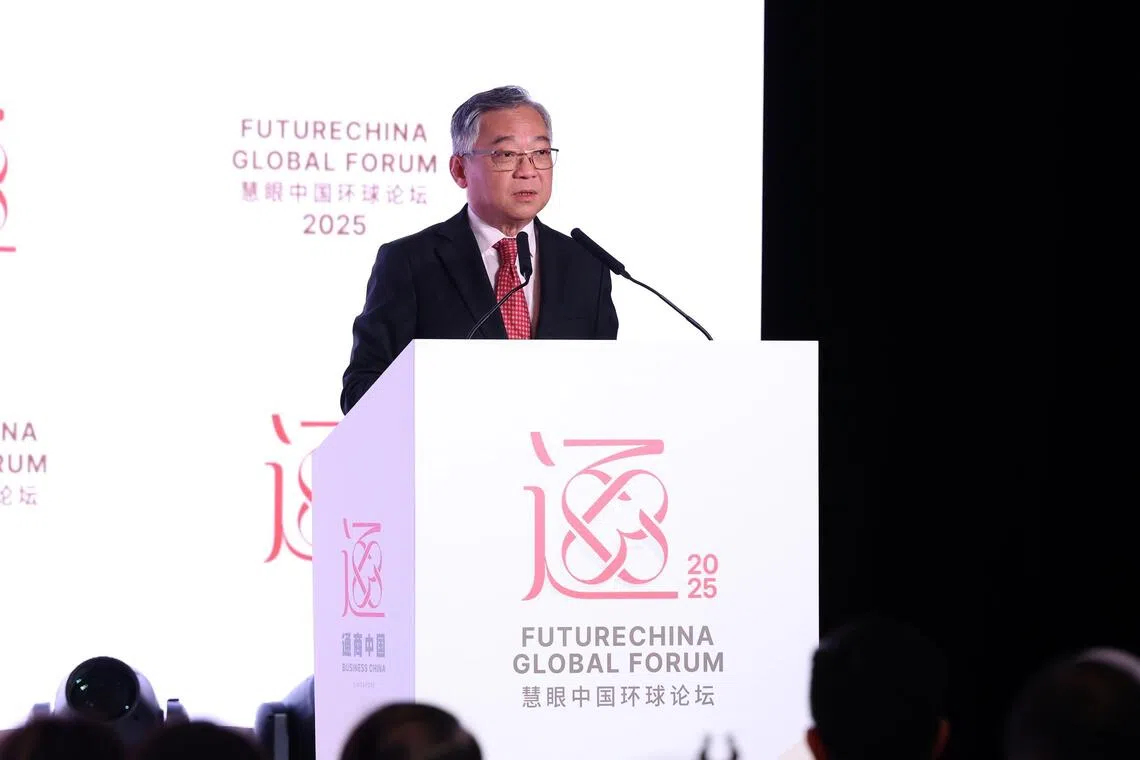WTO needs reform but abandoning rules-based system will be far worse for global economy: DPM Gan
Sign up now: Get ST's newsletters delivered to your inbox

The World Trade Organisation should adopt a pragmatic approach that supports flexible multilateralism, said Deputy Prime Minister Gan Kim Yong.
PHOTO: BUSINESS CHINA
Follow topic:
SINGAPORE – The World Trade Organisation (WTO) needs reform, and the rules of global trade and economy must evolve to build a stronger and more resilient global economy, said Deputy Prime Minister Gan Kim Yong.
Speaking at the FutureChina Global Forum organised by Business China, at the Sands Expo and Convention Centre on Sept 19, he noted that the trade war between the US and China has placed unprecedented strain on the global system and exposed the limitations of the WTO.
This means that the organisation’s old system of the 1990s no longer works in today’s economic climate, said DPM Gan, who is also Minister for Trade and Industry.
“The WTO has struggled to negotiate new agreements; its dispute settlement mechanism is paralysed; and core principles like the ‘most favoured nation’ treatment are at risk of being eroded,” he said.
With the US and China both heading towards unilateralism, their contestation has led to a sharp rise in protectionist measures in the form of tariffs, import quotas, export restrictions and investment screening requirements.
Should the fragile trade truce break and more countries resort to power-based approaches, there will be a greater risk of fragmented supply chains, rising uncertainty and weaker growth, DPM Gan cautioned.
But he stressed that while the WTO has not been effective in alleviating trade tensions, abandoning a rules-based system would be far worse for the global economy.
Therefore, the WTO should adopt a pragmatic approach that supports flexible multilateralism, to remain relevant and preserve its role as a global anchor for rules, said DPM Gan.
He said Singapore must resist the drift towards unilateralism and power-based politics.
He cited four areas in which the rules-based system will need to evolve to enhance cooperation among countries and meet the demands of the future economy:
New frameworks for digital trade and data governance are vital to meet the growing importance of the digital economy.
Advancements in artificial intelligence and quantum technology will require the establishment of new standards to ensure openness, safety and fairness.
For governments to pursue legitimate economic objectives without distorting competition, the global order will need clearer rules on industrial policy and subsidies.
Coordinated standards for the green transition are crucial in supporting the growth of carbon markets, green and transition finance, and trade in clean technologies.
DPM Gan also highlighted the importance of plurilateral agreements in shaping a more inclusive and progressive framework for the global economy.
Singapore established a Future of Investments and Trade Partnership
The member countries will work together on areas such as supply chain resilience, investment facilitation, non-tariff barriers and trade facilitation, and technology.
Other examples of plurilateralism include the Comprehensive and Progressive Agreement for Trans-Pacific Partnership, of which Singapore is a founding member, and the Regional Comprehensive Economic Partnership, the world’s largest free trade agreement, led by Asean with China, Japan, South Korea, Australia and New Zealand.
DPM Gan stressed that while these plurilateral agreements are not replacements for the WTO, they are instrumental in pioneering rules on new issues and creating benchmarks for future convergence as well as wider adoption.
The forum’s organiser, Business China, is a non-profit organisation that aims to strengthen ties between Singapore and China.
The forum, in its 16th edition, comes as 2025 marks 35 years of diplomatic relations between Singapore and China, with the two countries now intrinsically linked in trade and economic relations.
Since 2013, China has been Singapore’s largest trading partner, while Singapore has also been China’s largest foreign investor with cumulative investments to date amounting to $223 billion, including three major projects in Suzhou, Tianjin and Chongqing.
Bilateral trade in 2024 amounted to $170 billion, comprising 13 per cent of Singapore’s goods trade globally.
As the rules on global trade and order continue to be in flux, China’s role as a major investor in South-east Asia will become even more prominent, panellists at the forum said.
In a discussion on China’s trade with Asean, Bank of China (Hong Kong) deputy chief executive Wang Huabin said China will increase and diversify its investments in Asean countries, especially in the areas of technology, renewable energy and financial services.
In turn, Asean countries stand to benefit from this investment with greater innovations and improvements to their infrastructure.
China and Asean have become hugely intertwined in trade relations over the years, forming a link that is difficult to break by the US despite its attempts at disruption with tariffs, said Mr Tommy Xie, head of Asia macro research, global markets, at OCBC Bank.
This approach by the Trump administration in its ongoing contestation with China will most likely continue into the near and middle term as part of a cyclical change, rather than just a passing phase, said Mr Clark Jennings, managing director of global policy consulting firm Crowell Global Advisors in Asia.
He added that the world will have to figure out the new rules of trade, and raised his concerns about the sustainability of America’s stance in the current geopolitical climate.
Mr Weiheng Chen, global investment strategist at J.P. Morgan, said emerging markets in South-east Asia could capitalise on the weakening of the US dollar to invest in their technologies and infrastructure at a lower cost.
In a separate discussion, Avanda Investment Management founder Ng Kok Song said China must find ways to address its debt problem to avoid entering a long period of economic stagnation, a “disaster that befell the Japanese economy”.
Mr Ng, a former group chief investment officer of GIC, was referring to the debasement of the Japanese yen in the 2010s due to then Prime Minister Shinzo Abe’s aggressive monetary easing, also known as “Abenomics”.
“China cannot face a more difficult world to export itself out of a recession,” he said, adding that it is imperative for the Chinese government to avoid falling into the same situation as Japan did.
Correction note: In an earlier version of the story, we said that Singapore’s cumulative investments in China amounted to $233 billion. This is incorrect. It should be $223 billion. We are sorry for the error.


